Caffeine’s Impact On Blood Flow
Many people enjoy drinking coffee or caffeinated drinks before a blood draw for a variety of reasons. However, one should be aware of how these drinks can affect the body and make blood draws more difficult. Firstly, it is important to understand the effects of caffeine on the body. Caffeine is a stimulant that speeds up the heart rate and narrows blood vessels temporarily. The narrowing of the vessels reduces the amount of blood that can be taken easily, which can lead to a longer or more uncomfortable procedure.
Furthermore, caffeine can cause anxiety, which is not ideal before giving blood. An increase in anxiety can cause abdominal tension and make it difficult for veins to stand out. Additionally, caffeine can cause tremors, which can be especially problematic if a phlebotomist has difficulty locating veins.
Bottom Line: Avoid Coffee Before a Blood Draw
Given the potential complications that can occur due to caffeine intake prior to a blood draw, it is safe to say that it’s best to avoid coffee or any other caffeinated beverage before the appointment. If a person does decide to consume coffee before a blood draw, it’s best to do so in moderation, as more than two cups could further complicate things. However, it is advised to limit caffeine intake to avoid any unnecessary stress or complications.
Alternatives To Coffee Before A Blood Draw
If you’re looking for something to drink before a blood draw, experts suggest opting for water, as it helps to keep veins hydrated and makes them easier to locate. Additionally, water intake helps to prevent dizziness, which can be a common side effect of giving blood.
Moreover, some studies have found that having an orange juice prior to the procedure can also help to make the process smoother. The sugar and the vitamin C found in orange juice can help to make the veins easier to locate, plus it can also help to stabilize the patient’s blood sugar and prevent dehydration.
How To Properly Prepare For A Blood Draw
Prior to a blood draw, it’s important to follow a few simple steps to help the procedure go more smoothly.
Firstly, make sure to drink plenty of water before the appointment to help keep veins hydrated. Secondly, it’s advisable to increase iron and vitamin C intake in the days proceeding, as this can help to improve blood flow and make the procedure easier. And lastly, be sure to wear clothing that is easy to roll up and exposes the area to be drawn from.
Potential Complications of Caffeine Intake During a Blood Draw
In rare cases, caffeine intake can lead to complications during a blood draw. Some of the most common complications include increased anxiety, tremors, and difficulty locating the vein. If a person regularly drinks several cups of coffee before giving blood, they may need to be put on a form of sedation to make the procedure easier and less stressful.
If the phlebotomist has difficulty locating or accessing a vein, they may need to resort to using a butterfly needle. This relatively large needle is inserted under the skin to take a sample, and can be uncomfortable for some people.
Caffeine Intake and Its Impact On Blood Tests
In some cases, caffeine intake can also lead to an inaccurate reading of certain blood tests, such as glucose levels. Furthermore, it can interfere with electrolyte measurements, which can lead to an incorrect diagnosis.
It is therefore extremely important to inform medical professionals of any caffeine intake before the procedure. This will help them to avoid inaccurate readings and incorrect diagnoses.
Ongoing Research Into Caffeine Intake Before Blood Draws
The exact effects of caffeine on blood draws are still unknown. Along with the medical community, scientists are also continuously researching this topic.
Recently, researchers conducted a study to see if caffeine consumption affects the results of hemoglobin measurements. The study found that while caffeine did not have an immediate effect on the size of the red blood cells, it did cause an increase in the fragmentation of the cells.
This means that caffeine intake can lead to an inaccurate hemoglobin measurement. As such, it’s important to let medical professionals know if you have consumed caffeine before giving blood.
The Takeaway
On the whole, it is best to avoid coffee or any other caffeinated beverages before a blood draw. Drinking too much coffee can lead to a variety of complications, from increased anxiety and tremors to difficulty locating and accessing the vein.
Given that caffeine can also lead to inaccurate blood test results, it’s important to inform medical professionals of any beverage intake prior to the procedure. Drinking water and eating foods that are high in iron and vitamin C can help to keep veins hydrated and visible, which can make the process easier and less stressful in the long run.


